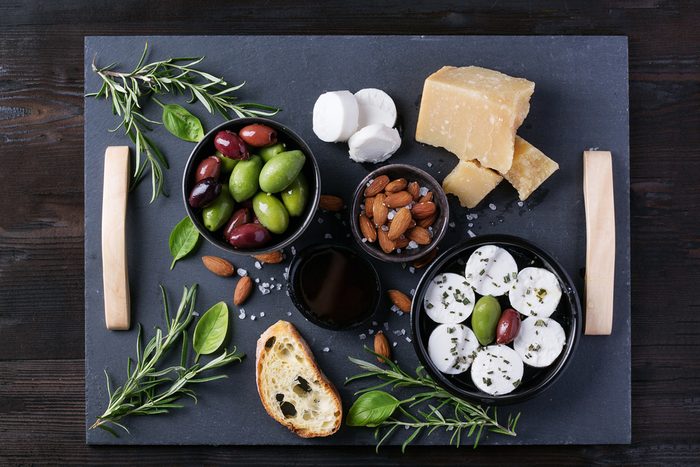
You go back for seconds when you’re not hungry
If you’re so stuffed after your office’s holiday lunch that you feel like you can barely breathe, you’ve overeaten. There’s a difference between feeling satisfied and feeling stuffed. “A lot of us mindlessly eat in social situations, sometimes because we’re distracted by conversation or we’re eating a lot of little appetizers without paying attention to our hunger and satiety cues,” says Abbey Sharp, RD, a blogger at Abbey’s Kitchen and author of The Mindful Glow Cookbook. Avoid this from happening by not immediately going back for seconds. “It takes time for our body to recognize that we’re satisfied,” she says. “After your first plate, give yourself a few minutes. Maybe enjoy a glass of water or some good conversation. Then re-evaluate if you’re still actually hungry.”
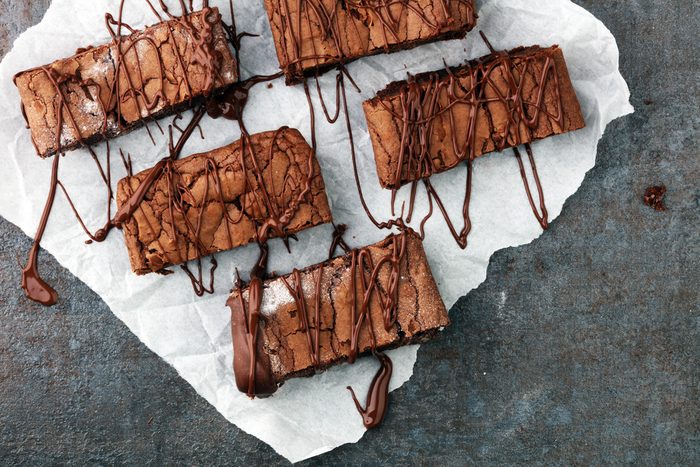
You sneak snacks and sweets
The brownies your mom sent are talking to you—so you head to the kitchen when everyone is asleep and finish them off. One issue may be that you’re not eating enough during the day, leading you to binge later, says Alix Turoff, MS, RD. Or maybe it’s emotional: “It could be something that you learned in childhood, like if sugar wasn’t allowed in your house,” she says, so you decide to indulge. For some people, feeling guilty about a lapse in willpower leads to private binging, says Sharp. Tackle the behavior by eating moderately and mindfully throughout the day—and choose foods you enjoy. “Then you won’t have a need to overdo it on a whole sheet of brownies,” Sharp says. “Once we stop restricting and letting go of a good-food and bad-food mentality, then we can notice the deliciousness and pleasure in nourishing foods.” Choose a healthy gift basket to give your friends to help them stay health-conscious over the holidays.
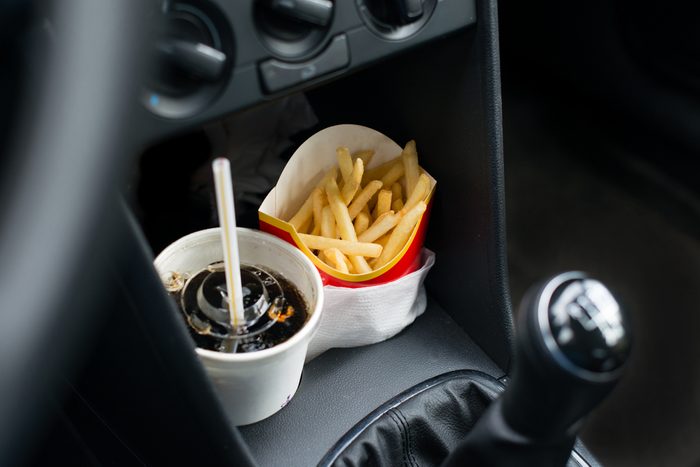
You eat too fast
“We’re obsessed with convenience and ease,” says Sharp. Fast food doesn’t only mean you get it quickly—you also scarf it down in a hurry. “We’ve stopped valuing the pleasure of eating in favor of quelling hunger quickly and efficiently.” University of Rhode Island researchers found that people with a high body mass index (BMI) ate faster than those with a low BMI. Speedier eaters ate about 33 percent more ounces of food per minute than slower eaters did. A peaceful eating environment dedicated to eating can help you slow down. “Eat sitting down,” says Sharp. “Whenever possible, avoid eating at your desk and in your car.” She adds that you should try to eat with friends and family. “It will help give you time between bites to catch subtle hunger and satiety cues.” These 31 tricks to avoid holiday weight gain will also come in handy.
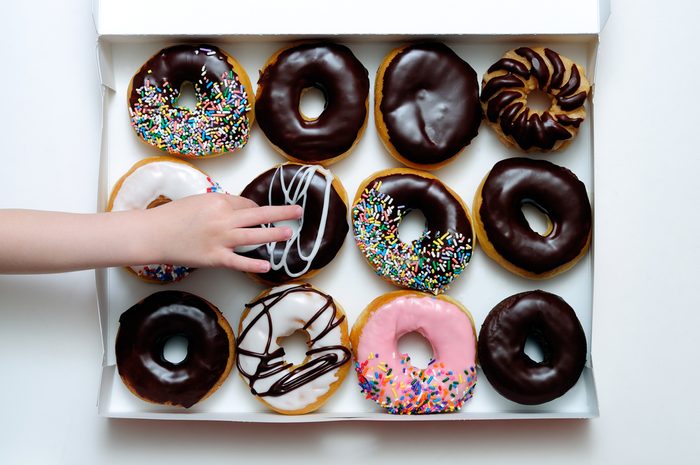
You see food as a reward
You’ve worked so hard all year—you’ve earned the right to binge at the buffet or eat all the Christmas cookies. “People use food as a reward because they think certain behaviors deserve to be rewarded,” says Roger Adams, PhD, a doctor of nutrition and owner of eatrightfitness.com, an evidence-based weight loss and fitness counseling practice in Houston. “People may use foods to reward themselves for almost any task: exercise, finances, breakups, job efforts, birthdays, etc.”
“Pleasure eating, as opposed to eating for hunger, activates reward signals in our brain,” says Jenna Appel, MS, RD, of Appel Nutrition. “That prompts us to eat more of the pleasurable food.” Treat yourself to non-food rewards, advises Appel. “Pamper yourself, splurge on something special, or reward yourself with something that will help you reach health and wellness goals.” Adams suggests that if you feel like you want to console yourself with food, do something that makes you happy, instead. “Read, workout, call a friend you haven’t spoken with in a while, or even just go outside for a walk with the dog,” he says.
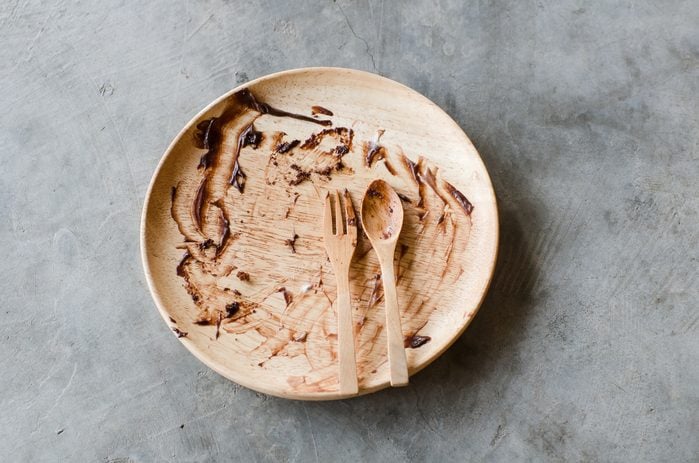
You always clean your plate
Yes, you may have been taught to do this, but it’s no longer a great idea—unless you’re careful about portion sizes. “That most likely was drilled into people’s head from parents when they were young,” says Dr. Adams. No one says you have to eat everything on your plate. “One simple strategy is to start with smaller plates,” says Dr. Adams. “That will lead to less food consumed.” If you’re dining out, he suggests splitting a meal with someone or asking your waiter to put half your meal in a to-go container immediately so you’re only served a half-portion. Find out what to eat before a holiday party, so you don’t go overboard.
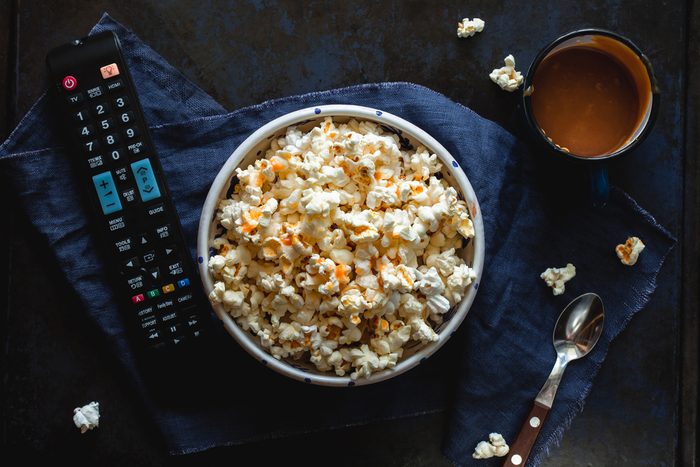
You eat when you’re bored
You’re killing time in front of the TV, and suddenly that appetizer plate is bare. You’re better off keeping the apps and other treats out of reach, says Allison Tibbs, a San Francisco-based personal trainer and healthy lifestyle coach. Use a plate to take only what you need to address your hunger. “The key is to keep healthy snacks in the house, at work, and on the go. That way when hunger strikes, you won’t be tempted to eat the cookies.” Another option to tame bored eating is to find ways to occupy your mind until you can assess where you’re really hungry. You may also want to turn off the tube, says Dr. Adams: “The TV is loaded with food advertisements.”
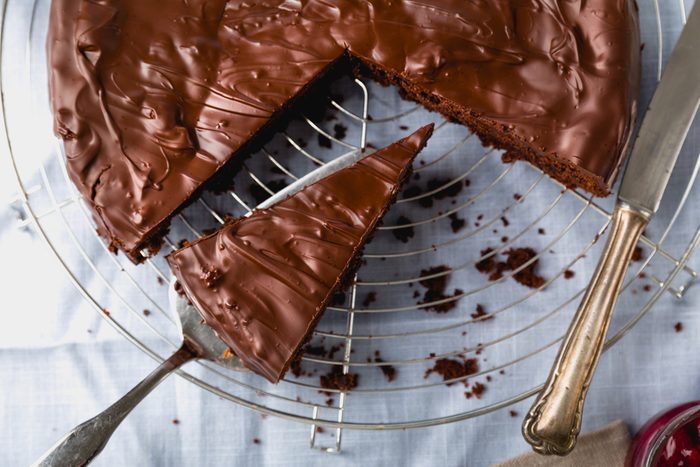
You cut yourself off from your favorites
If you swear you won’t have any artichoke dip, and later find yourself swabbing up the last bits with a pita slice, you need to take charge. “Try not to limit and deprive yourself of certain foods—you’re setting yourself up to feel compulsive or out of control around these foods,” says Jennifer Rollin, MSW, LCSW-C, therapist and founder of The Eating Disorder Center in Rockville, Maryland. “Saying that certain foods are off-limits will likely only lead to developing an unhealthy relationship with food.” Instead, be flexible, Tibbs says. If chocolate is your weakness, let yourself have a piece of chocolate cake three times over the holiday season, for example. “This gives you some flexibility, reduces the risk of overindulging, and creates a healthier relationship with food.”
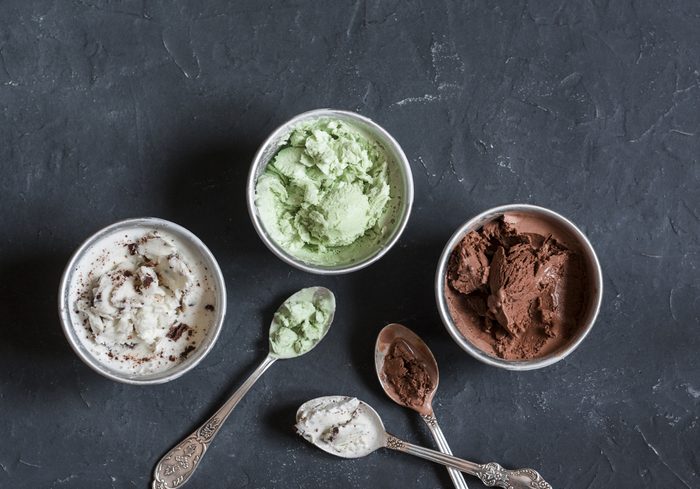
You use food to help you cope
Do you turn to food when you’re stressed and sad? “There is nothing wrong with eating a cupcake when you feel sad,” says Rollin. “The problem is when this becomes your primary coping mechanism for dealing with uncomfortable emotions.” Think about why you’re using food for comfort: “We get hung up on what we eat and how much we eat,” says Liza Baker, an Integrative Nutrition Health Coach, chef and author of the e-book, Thanksgiving 101. “We rarely look at why we eat and how it makes us feel.” Speak with a trusted family member or friend about what’s going on. Plan to go for a walk or to the gym the next time you want to reach for food. Take some deep breaths. “Find other outlets than food for your emotions,” says Baker. “It’s even more important not to let those outlets mask or push away the source of the issue.” Look out for these 8 other reasons you can’t stop eating.
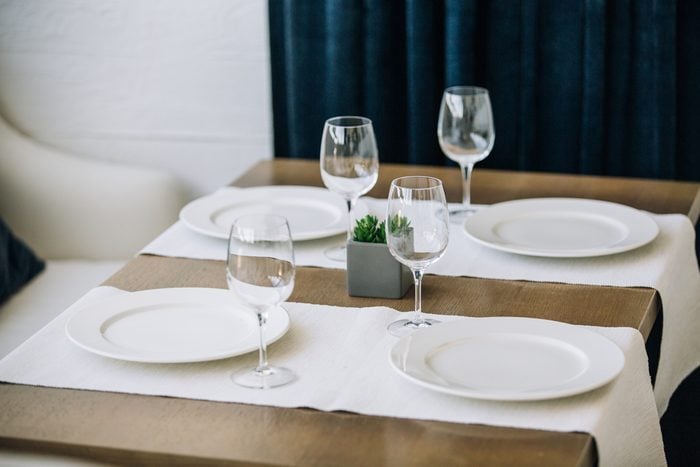
All bets are off at a restaurant
Dinner with the girls on Friday night. Lunch with colleagues on Wednesdays. Everyone likes to eat out, but it’s easy to overdo it. The portions will be larger, the food is loaded with calories, fat, and salt, and then there’s the bread basket. A study in Public Health Nutrition found that people who eat at restaurants tend to consume 200 more calories than they would with a home-cooked meal. “Eating out can be a nice treat once in a while or an opportunity to socialize with friends,” says Rory Hornstein, RD. “But the fat, calories, sugar, and sodium can add up quickly if you eat out regularly.”
Hornstein recommends keeping a food diary when you dine out and plan what you’ll eat before you leave home. “Look at menus online beforehand to see what types of food they have,” she says. “With a little planning, you can make healthier choices.” Choose protein-based entrees and green sides—and don’t be afraid to ask for substitutions.
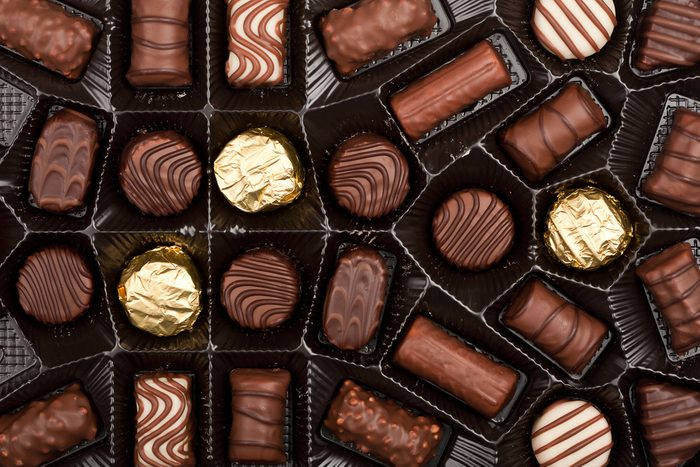
You eat your favorite holiday treat in one sitting
Maybe it’s See’s chocolates. Or homemade fudge. We all have different trigger foods; once we’ve had a bite, we can’t stop. Learn what your trigger foods are and keep them out of your house. “Put some thought into what foods might be your triggers,” says Phyl London, a personal trainer who specializes in Pilates and group exercise instruction. She created Bodiphy, a program that combines Pilates, Barre, and strength and alignment training. “Chocolate and ice cream can be in my house for days and I won’t overeat them,” says London. “For me, I can’t have tortilla chips, pretzels, or pita chips around. Those are the kinds of foods that I would overeat if I came home tired from a long day at work.” Check out these 50 ways to have your healthiest holiday ever.
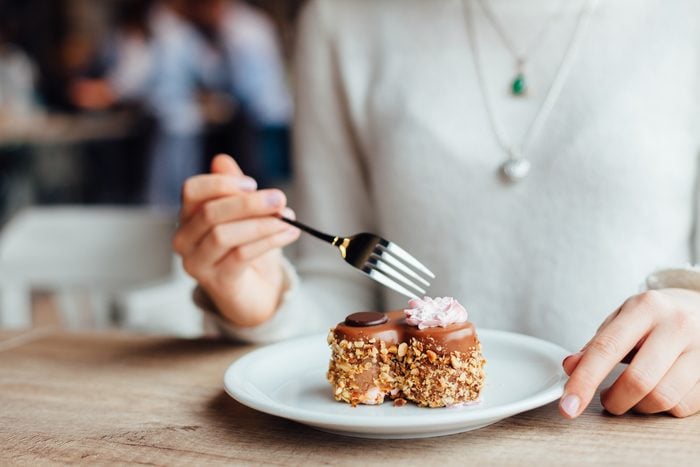
You don’t appreciate every mouthful
Some research suggests that after the first few bites, we’ve gleaned most of the pleasure from the food we eat. “Becoming mindful doesn’t mean you have to savor the inner essence of every raisin you consume,” says Patricia Bannan, MS, RDN, a Los Angeles-based nutritionist and healthy cooking expert. “All you have to do is spend an extra few minutes focusing on your food, its taste, how it smells, and the texture. You’ll find you eat more slowly, enjoy your food more, and are satisfied with less.” Here are 12 more sneaky causes of overeating.
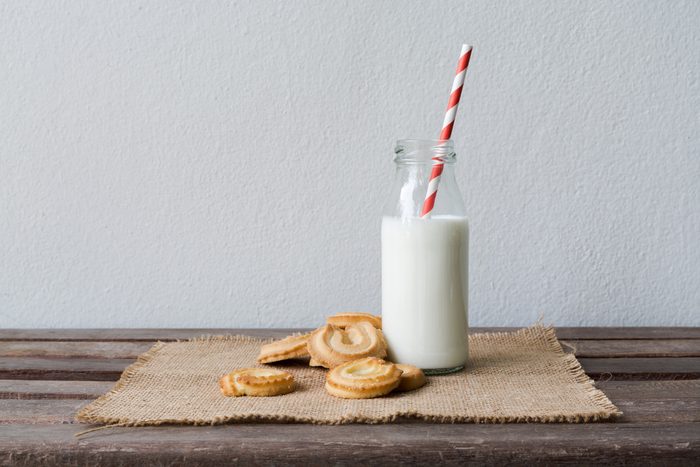
You get nostalgic about food
Ah, Grandma’s Christmas cookies: You remember how their aroma filled the whole kitchen. This nostalgia can make you feel warm and happy—and lead you to overeat those cookies. “To keep the memories alive of people who may no longer be with you, you owe it to them to celebrate their memory with positive emotions and thinking,” says Tracy Lockwood Beckerman, RD, of Tracy Nutrition; she’s also the in-house nutrition expert at Betches Media. “You want to be able to nurture those memories with food and not feel guilty about getting caught in those happy times.”
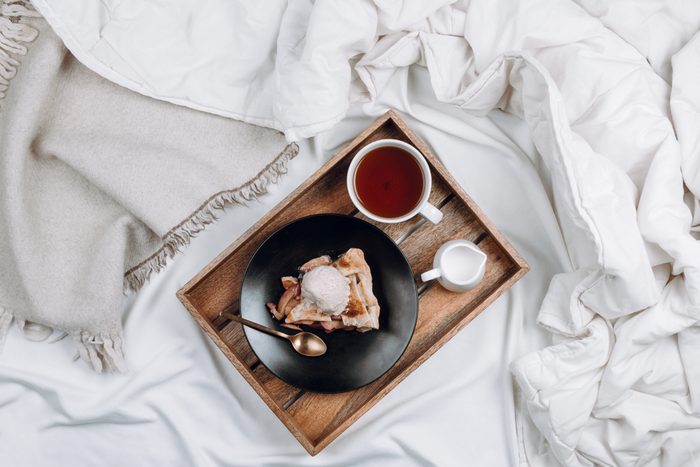
You need a nap ASAP
You know the feeling: You’re so lethargic you can barely move after eating too much. “Your body gets sleepy after you eat a large meal of any sort—not just after a holiday meal—because it’s expending lots of energy to digest, break down, and absorb food particles along your gastrointestinal tract,” says Beckerman. “After a while, your body wants a break. That’s when the sleepiness and lethargy kick in.” To avoid this trap, she suggests breaking your large meal into two smaller ones. “Because you won’t have a huge plate in front of you, you’ll naturally be more mindful about the pace of your meal because you’ll want to savor each bite.” She adds that you’re also doing your stomach a favor by eating smaller amounts. “That way, it can break down the food more efficiently, rather than being overwhelmed with what it has to digest.” Don’t miss these 20 other ways to beat post-holiday weight gain.